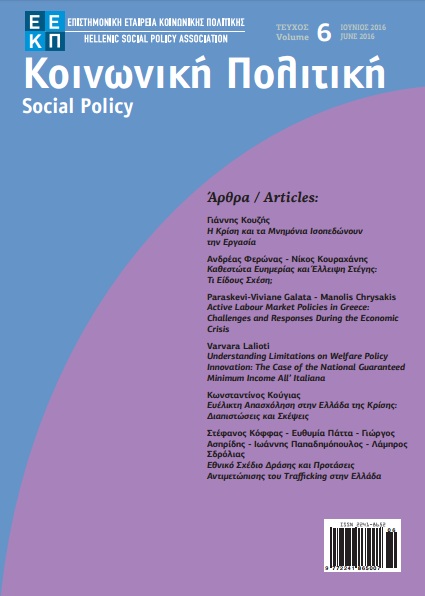Active Labour Market Policies in Greece: Challenges and Responses During the Economic Crisis

Περίληψη
Οι επιπτώσεις της ύφεσης στην Ελλάδα και τα μέτρα λιτότητας που προωθούνται στο πλαίσιο των Προγραμμάτων Οικονομικής Προσαρμογής είχαν καταστροφικό αντίκτυπο στην αγορά εργασίας. Παρά το γεγονός ότι εισάχθηκαν αρκετές μεταρρυθμίσεις στην αγορά εργασίας και την κοινωνική προστασία, υπάρχουν αμφιβολίες κατά πόσον οι λύσεις που υιοθετήθηκαν υπήρξαν αποτελεσματικές μέχρι στιγμής για την άμβλυνση των επιπτώσεων της κρίσης. Η παρούσα εργασία αποβλέπει να διερευνήσει το ρόλο των ενεργητικών πολιτικών αγοράς εργασίας στην Ελλάδα κατά τη διάρκεια της οικονομικής κρίσης και τις αναγκαίες προϋποθέσεις για την ενίσχυση της συμβολής τους στη μείωση των κοινωνικών επιπτώσεων της κρίσης. Τα ευρήματα από την ανάλυση της βιβλιογραφίας δείχνουν ότι υπάρχουν αρκετές προκλήσεις για την προώθηση ενεργητικών πολιτικών αγοράς εργασίας, ιδιαίτερα σε περίοδο ύφεσης, υπό την προϋπόθεση ότι δεν θα υποκαταστήσουν τις θεμελιώδεις εγγυήσεις της αναπλήρωσης του εισοδήματος και ότι θα πρέπει να συνδέονται με μια ολοκληρωμένη πολιτική δημιουργίας θέσεων εργασίας, διατηρώντας παράλληλα το δημόσιο χαρακτήρα και το ρόλο του κράτους που δεν πρέπει να υπονομεύονται με το πρόσχημα των δημοσιονομικών περιορισμών.
Λεπτομέρειες άρθρου
- Πώς να δημιουργήσετε Αναφορές
-
Galata, P. .-. V., & Chrysakis, M. (2017). Active Labour Market Policies in Greece: Challenges and Responses During the Economic Crisis. Κοινωνική Πολιτική, 6, 45–66. https://doi.org/10.12681/sp.10880
- Τεύχος
- Τόμ. 6 (2016)
- Ενότητα
- Άρθρα

Αυτή η εργασία είναι αδειοδοτημένη υπό το CC Αναφορά Δημιουργού 4.0.
Οι συγγραφείς των άρθρων που δημοσιεύονται στο περιοδικό διατηρούν τα δικαιώματα πνευματικής ιδιοκτησίας επί των άρθρων τους, δίνοντας στο περιοδικό το δικαίωμα της πρώτης δημοσίευσης. Άρθρα που δημοσιεύονται στο περιοδικό διατίθενται με άδεια Creative Commons 4.0 και σύμφωνα με την άδεια μπορούν να χρησιμοποιούνται ελεύθερα, με αναφορά στο/στη συγγραφέα και στην πρώτη δημοσίευση για μη κερδοσκοπικούς σκοπούς και με δικαίωμα τροποποίησης μόνον με παρόμοια διανομή (αν αναμείξετε, τροποποιήσετε, ή δημιουργήσετε πάνω στο υλικό, πρέπει να διανείμετε τις δικές σας συνεισφορές υπό την ίδια άδεια όπως και το πρωτότυπο).


